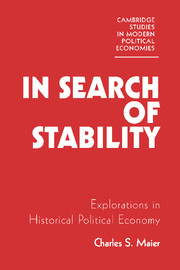Book contents
- Frontmatter
- Contents
- Acknowledgments
- Introduction: Political economy and history
- Part I Ideology and economics from World War I to midcentury
- Part II Collective preferences and public outcomes
- 5 The politics of inflation in the twentieth century
- 6 “Fictitious bonds … of wealth and law”: on the theory and practice of interest representation
- Conclusion: why stability?
- Index
6 - “Fictitious bonds … of wealth and law”: on the theory and practice of interest representation
Published online by Cambridge University Press: 15 December 2009
- Frontmatter
- Contents
- Acknowledgments
- Introduction: Political economy and history
- Part I Ideology and economics from World War I to midcentury
- Part II Collective preferences and public outcomes
- 5 The politics of inflation in the twentieth century
- 6 “Fictitious bonds … of wealth and law”: on the theory and practice of interest representation
- Conclusion: why stability?
- Index
Summary
This essay was written for the first research project of the Joint Committee on Western Europe of the Social Sciences Research Council and the American Council of Learned Societies. It was published in Suzanne Berger, ed., Organizing Interests in Western Europe (Cambridge University Press, 1981), pp. 27–61. The objective was to survey the changing ways in which modern societies mediated among collective interests. The essay cited the ideological arguments that initially allowed particular “interests” to be seen as legitimate, and not just an expression of cabal or conspiracy. Then it traced the pressures under which parliamentary aggregation of interests in an era of mass suffrage, international economic rivalry, and an emerging labor movement might have to be supplemented by direct mediation among producer groups – the forerunner of what has become known as corporatism or neocorporatism. At the time the essay was drafted in the late 1970s, neocorporatist tendencies appeared to be advancing steadily throughout Western capitalist societies. In retrospect this trend can be partially understood as a response to the pervasive inflation that led policy makers and interest group representatives alike to search for ways of controlling the allocation of national income and political influence. Many of the social compacts then negotiated under government auspices proved ephemeral; and neocorporatism increasingly seems to have been one recourse among others for coping with the politics of distributive conflict. Thus the essay was correct, I believe, to hint that the balance between parliamentary and interest group representation might not follow a continuing trend, but could shift again.
- Type
- Chapter
- Information
- In Search of StabilityExplorations in Historical Political Economy, pp. 225 - 260Publisher: Cambridge University PressPrint publication year: 1988

